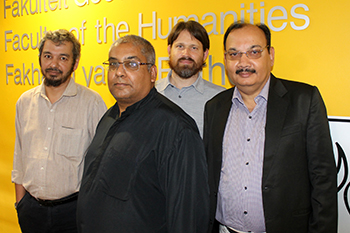Latest News Archive
Please select Category, Year, and then Month to display items
14 June 2024
|
Story Anthony Mthembu
|
Photo Suplied
 Jeremiah Hlahla, a UFS student completing his PhD in Botany at the University of Debrecen as part of an exchange initiative funded by the Erasmus+ Mobility Programme.
Jeremiah Hlahla, a UFS student completing his PhD in Botany at the University of Debrecen as part of an exchange initiative funded by the Erasmus+ Mobility Programme.
As part of an exchange initiative facilitated by the Erasmus+ Mobility Programme, Jeremiah Hlahla, a student at the University of the Free State (UFS), is nearing the completion of his PhD studies at the University of Debrecen in Hungary. Hlahla’s journey, which began in February 2024 and is set to conclude in July 2024, has been a remarkable learning opportunity. “As a first time-traveller to Europe, I have thoroughly enjoyed engaging with people from different countries and cultures,” he said.
The benefits of international collaboration
Hlahla is currently pursuing a PhD in Botany, focusing on plant stress physiology. “My current PhD project investigates the physiological, biochemical and morphological responses of vegetable-type soybean, or edamame, to combined drought and heat stress,’’ he explained. He considers the University of Debrecen the ideal institution to complete his research due to its extensive expertise and resources in similar projects. He noted that his colleagues at Debrecen conduct significant work on plant protection against biotic and abiotic stresses, including salt and drought stress, as well as proteins and amino acids in barley and other legumes.
Given the vast knowledge available on similar projects, Hlahla has found substantial engagement with his work at the University of Debrecen. “Upon arrival, I delivered an introductory lecture presenting my UFS project on the synergistic effects of combined drought and heat stress on the physiology and biochemistry of edamame. It was an engaging session as everyone could relate to my work and asked many questions,’’ he said.
Insights gained from the exchange
Hlahla has also gained valuable lessons that will assist him in his research career, including biotechnology and physiology tools. “I learned how to prepare samples and use high-performance liquid chromatography (HPLC) and reversed-phase ultra-high-performance liquid chromatography (UHPLC) to quantify proteins and amino acids,’’ he said. These techniques are beneficial not only for his current work but will also support future soybean research.
As his experience at the University of Debrecen nears its end, Hlahla reflects on the collaborations and friendships he has formed, which stand out as a significant highlight.
SA and Africa must avoid going over the edge
2017-02-26

From left are: Prof JM Moosa (Centre for African
Studies, Jawaharlal Nehru University, India),
Prof Hussein Solomon (Senior Professor: Political
Studies and Governance at the UFS),
Prof Virgil Hawkins (Osaka School of International
Public Policy Studies, Osaka University in Japan), and
Prof Ajay Dubey (Centre for African Studies, Jawaharlal Nehru
University, India).
Photo: Jóhann Thormählen
South Africa and the rest of Africa might be standing on the edge of a cliff and therefore conversations are necessary to avoid tipping over. According to Prof Hussein Solomon that was why a conference to address these issues was recently co-hosted by the University of the Free State (UFS).
Prof Solomon, Senior Professor of Political Studies and Governance at the UFS, said the continent and country needed to make the right decisions. “These right choices refer to the correct economic, political, and social policies.”
International delegates attend
Delegates from India, Japan, Zambia, Lesotho and South Africa attended the conference, called A View from the Precipice: Critical Reflections on South Africa and Africa in the 21st Century, on 13 and 14 February 2017 on the Bloemfontein Campus. It was co-hosted by the UFS Department of Political Studies and Governance, Jawaharlal Nehru University (India), Centre for the Engagement on African Peace and Security, Southern African Centre for Collaboration on Peace and Security and Osaka University (Japan).
Prof Solomon said external actors provided a useful mirror as they gave an idea of how Africa and South Africa were viewed from abroad.
Creating a knowledge-sharing forum
“It is not just about sharing knowledge, but creating a forum for sharing knowledge,” said Prof Virgil Hawkins from the Osaka School of International Public Policy Studies.
Prof Hawkins, who is a visiting professor at the UFS, said a conference like this was one of the cornerstones of the relationship between the UFS and Osaka University. Prof Solomon is also a visiting professor at last mentioned university.
Highlights of conference
Prof Solomon said some of the discussions included that “the ANC government is in crisis and is dragging the rest of the country with it”. Another participant said that 80% of the jobs in the next 20 years had not been created yet – which put the relevance of tertiary education in the spotlight.